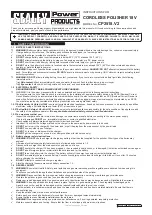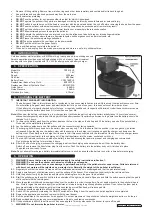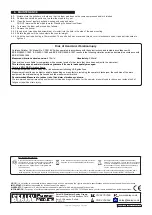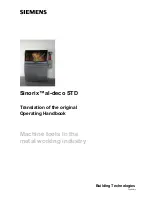
InstructIons for:
cordless PolIsHer 18V
MoDEL no:
cP2518.V2
thank you for purchasing a sealey product. Manufactured to a high standard this product will, if used according to these instructions and
properly maintained, give you years of trouble free performance.
1. sAFeTY INsTrUcTIoNs
IMPORTANT:
PleAse reAd THese INsTrUcTIoNs cAreFUllY. NoTe THe sAFe oPerATIoNAl reQUIreMeNTs, WArNINGs & cAUTIoNs.
Use THe ProdUcT correcTlY ANd WITH cAre For THe PUrPose For WHIcH IT Is INTeNded. FAIlUre To do so MAY cAUse
dAMAGe ANd/or PersoNAl INJUrY ANd WIll INVAlIdATe THe WArrANTY. PleAse KeeP INsTrUcTIoNs sAFe For FUTUre Use.
1.1 BATTerY sAFeTY INsTrUcTIoNs.
WARNING!
Battery contains nickel-cadmium which is dangerous. Handle with care to avoid damage, fire, corrosion or personal injury.
charge battery prior to first use. the battery pack will have been shipped in a low charge state.
use only the charger provided to charge the drill battery.
do NoT
charge battery when room temperature is below 50°f (10°c) or above 104°f (40°c).
do NoT
attempt recharging the battery by means of an engine generator or a Dc power source.
do NoT
short-circuit the battery by linking both terminals with a metal object, or your fingers etc.
do NoT
store the battery (or polisher) in locations where the temperature may exceed 104°f (40°c) such as outside sheds, above
heaters, or metal buildings in summer.
WARNING! Dispose of spent batteries correctly as they contain nickel-cadmium. DANGER! do NoT attempt to disassemble the battery
pack. For safety and environmental reasons
do NoT discard in domestic waste or by burning. ONLY discard or recycle according to local
authority regulations.
WARNING! do NoT allow a leaking battery to contact your person. If you come into contact with battery liquid take the following
immediate action:
a) Skin contact: Wash immediately with soap and water, then wash flesh in either lemon juice or vinegar.
b) Eye contact: Wash with a strong solution of boric acid, and seek immediate medical attention.
1.2 elecTrIcAl sAFeTY.
REGARDING DIRECT MAINS POWER USE WITH THE CHARGER.
WArnInG! It is the owner’s responsibility to read, understand and comply with the following electrical instructions:
You must ensure the risk of electric shock is minimised by the installation of appropriate safety devices. An rccB (residual current
circuit Breaker) should be incorporated in the main distribution board. We also recommend that an rcD (residual current Device) is
used with all electrical products, particularly portable equipment which is plugged into an electrical supply not protected by an rccB.
You must also read and understand the following instructions concerning electrical safety.
1.2.1
The Electricity At Work Act 1989
requires all portable electrical appliances, if used on business premises, to be tested by a qualified
electrician, using a Portable Appliance tester (PAt), at least once a year.
1.2.2
The Health & Safety at Work Act 1974
makes owners of electrical appliances responsible for the safe condition of the appliance, and
the safety of the appliance operator.
If in any doubt about electrical safety, contact a qualified electrician.
1.2.3 You must ensure that you:
Inspect the charger and cable for wear and damage to ensure items are safe before connecting to the mains power supply.
If worn or damaged
do NoT
use, immediately replace, or contact a qualified electrician.
check cables are always protected against short circuit and overload.
Important: check that the voltage marked on the charger is the same as the power supply to be used.
do NoT
pull or carry the charger by the power lead, or pull the plug from the mains socket by the power lead.
do NoT
use any other type of charger.
do NoT
try to open or dis-assemble the charger.
do NoT
get the charger wet, or use in wet, damp conditions (for indoor use only).
1.3 Battery charger safety instructions.
WARNING!
do NoT
use the charger to charge any battery other than that supplied for the polisher. other types of batteries may
explode!
All mains electrical supply safety features must be followed as described in 1.2.
Disconnect the charger from the mains power supply when not in use.
do NoT
operate the charger if it has been dropped, or has received a sharp knock, or is damaged. contact an authorised service agent.
do NoT
insert foreign objects or material into the hole reserved for the battery.
do NoT
force the battery into the charger. the battery will only fit one way to ensure correct polarity alignment.
do NoT
immediately charge a second battery. consecutive charging will overheat the charger. Allow the unit to cool for 15 minutes
before charging the next battery.
do NoT
attempt to connect two chargers together.
store the charger in the same manner as battery, see section 1.2.
1.4 GeNerAl sAFeTY
WARNING!
Ensure that Health & safety, local authority and general workshop practice regulations are adhered to when using this
equipment.
familiarise yourself with the application, limitations and potential hazards of the polisher.
WARNING!
Disconnect from the mains power before changing accessories, servicing or performing any maintenance.
Maintain the polisher in good condition (use an authorised service agent).
replace or repair damaged parts. use genuine parts only. unauthorised parts may be dangerous and will invalidate the warranty.
WARNING!
Keep all guards and holding screws in place, tight and in good working order. check regularly for damaged parts.
A guard or any other part that is damaged must be repaired/replaced before the tool is next used.
use the polisher in a suitable work area and keep the area clean and tidy and free from unrelated materials. Ensure that there is
adequate lighting.
Keep the polisher clean for best and safest performance.
Before each use check all attachments for condition. If worn or damaged replace immediately.
Ensure that there are no flammable materials near the work area.
WARNING!
Wear approved safety eye protection, ear defenders and, if dust is generated, respiratory protection.
Maintain correct balance and footing. Ensure that the floor is not slippery and wear non-slip shoes.
Original Language Version
cP2518.V2 Issue: 3 - 22/12/11





















